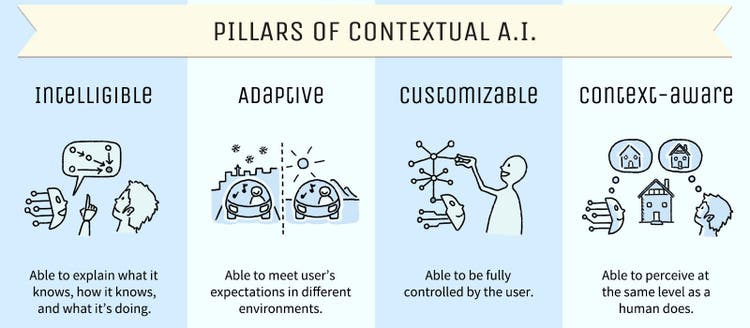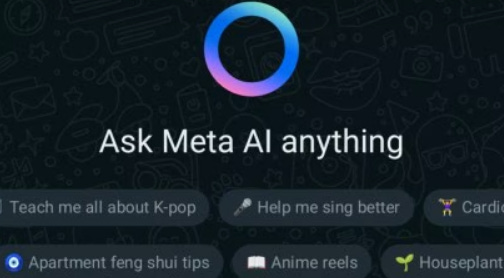🎧Audible's AI Solves Search Discovery Problem
AI is transforming how we find stuff online, making discovery easy for e-commerce and content platforms. We explore Audible's new AI search which is the latest development in this trend.
Three things you’ll get from TWIP today…
Audible by Amazon recently launched Maven - a context aware AI search engine. we explore how AI-powered search solves the discovery problem of online platforms with large databases of products or content.
An interesting video where Jensen Huang, CEO of NVIDIA, and Mark Zuckerberg, CEO of Meta talk about AI breakthroughs and how generative AI and open-source software will empower developers and creators.
News from this week that matters for product leaders
🔍Audible's AI Solves Search Discovery Problem
Audible, the audiobook company owned by Amazon, recently announced that it is testing Maven - an AI-powered conversational “personal recommendation” search feature to assist users discover audiobook quickly and easily.
For instance, a user can use natural language to enter queries like “I’m looking for an adventure novel with a female protagonist,” or, “Show me audiobooks that I can complete during a 3-hour drive.” Maven will respond with tailored recommendation pulled from Audible’s catalog of nearly one million titles🎧
And it’s not just Amazon that is incorporating AI search features. Recently, we saw WhatsApp incorporate MetaAI in search with more powerful and comprehensive use cases than Audible.
🔍This Week in Products we explore how AI-powered search solves the discovery problem of online platforms with large databases of products or content.
🧩Discovery Problem - The search for the needle in the haystack
The problem of discovery has always been a central challenge for platforms with vast databases - whether it's a library of books, a streaming service with millions of movies, or an e-commerce site with countless products - the sheer volume of options can be overwhelming for the user😓
According to the Google Cloud-commissioned Harris Poll survey, search abandonment—when a consumer searches for a product on a retailer’s website but does not find what they are looking for—costs retailers more than $300 billion annually in the United States alone💸
Ninety four percent of consumers globally report receiving irrelevant results while searching on a retailer’s website, and 84% believing that consumers are less loyal to brands when they’ve had unsuccessful searches😤
According to research, nine in 10 consumers say a good search function is “very important” or “absolutely essential,” with 97% agreeing that their favorite retail websites are ones where they can quickly find what they are looking for.
Three out of four U.S. consumers (76%) surveyed also report that an unsuccessful search resulted in a lost sale for the retail website, with 48% purchasing the item elsewhere.
Bad search experiences are costly, while good search experiences often result in higher conversion, larger order sizes, and ongoing brand loyalty. The impact of search experiences are not just restricted to online retail platforms. It applies to all platforms with large databases that have a discovery problem.
❌The Problem with current in-app search mechanisms
While in-app search engines have long been the primary tool for information retrieval, traditional methods based on keywords and metadata, often yield irrelevant results and fall short of helping users find what they truly want. Faceted search, while helpful, can be cumbersome for complex queries.
*Faceted search is a method of searching through attributes in the data, to gradually filter down a large selection of data to a smaller one that we are looking for.
🧠Semantic search was a step forward, attempting to grasp the meaning behind search terms. It relied on structured data and predefined rules to deliver more relevant results. However, its capabilities were limited by its inability to truly comprehend the nuances of human language.
With millions in revenue on the line and clear indication from consumers that online shopping and omnichannel services are here to stay, combatting search abandonment is essential to keep customers coming back. Doing so doesn’t have to be daunting.
🚀Context-aware AI offers a potential solution to discovery problem
By understanding context of search queries, AI-powered search delivers more relevant results, even when users are unsure🧐 of exact keywords or filters to use. So, the future in-app search engines we create must not just be glorified keyword or semantic search. It must be context-aware.
Product leaders can take a leaf out of Audible’s Maven and create a context-aware conversational agent that understands natural language queries, interprets user intent, and delivers highly personalized recommendations. This way we simplify discovery for users searching for what they want in platforms with large databases.
💡So, how does AI help users navigate this complexity?
Natural Language Processing🗣️: By enabling users to search using natural language, AI can break down the barriers of traditional keyword-based search. This allows for more intuitive and flexible queries.
Understanding User Intent💭: By analyzing user behavior, search history, and even external data, AI can develop a deep understanding of a user's preferences, needs, and goals. This enables the system to anticipate user needs and provide relevant suggestions before a query is even formed.
Personalization🎯: AI can create highly personalized search experiences by tailoring results to individual users. This involves considering factors such as demographics, purchase history, and content consumption patterns.
🛠️Learning from products who have established AI search
Several companies have explored the potential of AI in search and coupled it with their recommendation engines. Whether it's a product catalog, a knowledge base, or a media library, the ability to efficiently and accurately locate specific items or data within websites is critical.
📦Amazon Product Search
Amazon's product search has significantly benefited from AI integration. By analyzing customer behavior, purchase history, and product reviews, Amazon's search algorithm delivers personalized recommendations. Features like "Customers Who Bought This Item Also Bought" and "Frequently Bought Together" are AI-powered, enhancing the shopping experience. Additionally, Amazon's visual search capabilities allow users to find similar products based on images, demonstrating the power of AI in revolutionizing product discovery.
💬WhatsApp’s Meta AI
WhatsApp's integration of Meta AI is a recent development that showcases the potential of AI in transforming communication platforms. By understanding the context of conversations, Meta AI can provide relevant information, suggestions, or even generate text formats.
This integration not highlights the potential for AI to enhance search and discovery within messaging apps. Not just that, MetaAI IN WhatsApp promises to simplify access to AI assistance within the app, eliminating the need for users to navigate to other AI conversation apps like ChatGPT.
📊Enterprise Search Tools like Algolia
Search-as-a-service platforms like Algolia have integrated AI to enhance information retrieval within organizations or any web platforms. By understanding context of search queries and structure of in-house data, these tools deliver precise, adaptive, and relevant results in real-time, improving productivity and decision-making.
These are just a few examples of how different products and service providers use AI to enhance search capabilities inside platforms. As AI technology continues to advance, we can expect to see even more innovative applications emerge.
🔮Beyond Search: A New Era of Product Discovery
Now that we understand how AI in in-app search enables ‘intuitive’ discovery for users, product leaders need to go a step further. It's not just about suggesting items; it's about creating an immersive and personalized product discovery journey.
Here are three ways to enhance search experience:
Interactive Search: Imagine a search experience that feels like a conversation. AI can guide users through a series of questions, refining their search parameters with each interaction. For example, a user seeking a new pair of jeans might be asked about their preferred style, fit, and color. The AI can then present a curated selection based on these preferences🛍️
Visual Search: The future of search is visual. AI-powered image recognition allows users to upload a photo of an item they like and find similar products. This opens up a world of possibilities, from fashion to home decor. Product leaders can consider integrating visual search with augmented reality (AR) to let users virtually try on clothes or visualize furniture in their homes🛋️
Voice Search: The rise of voice assistants has paved the way for voice-driven search. AI can understand natural language queries, making it easier for users to find what they need without typing. Imagine searching for "a cozy sweater for a chilly evening" and getting relevant results instantly🗣️
These innovations go beyond mere product suggestions; they transform the search experience into an engaging and interactive process. By understanding user intent and preferences at a deeper level, AI can create personalized journeys that delight customers and drive conversions.
One video you must watch this week
AI and The Next Computing Platforms With Jensen Huang and Mark Zuckerberg
I found this video to be very interesting. Artificial intelligence and computing platforms are evolving at an unprecedented pace, transforming industries and everyday life. At a recent event, Jensen Huang, CEO of NVIDIA, and Mark Zuckerberg, CEO of Meta, shared their perspectives on these advancements, how fundamental research is enabling AI breakthroughs, and how generative AI and open-source software will empower developers and creators.
Watch this video if you want to learn more about
Open Source AI development
How AI will redefine and democratize smart glasses and mixed reality
Impact of AI on day-to-day workflow
Role of GPUs in AI
Future of AI Assistants and agents
Also, read…
📰News from this week that matters for product leaders
Applications for Google for Startups Accelerator: Apps India 2024 is now open until August 15, 2024. The three-month mentorship program is for Android app startups in India. Google will provide mentorship on product development, technology, security, and user growth to 20 eligible app companies. A key focus of the program is equipping startups with AI knowledge and tools.
OpenAI mulls watermarking ChatGPT generated text. Apparantly OpenAI has had the system ready for years, but it has failed to reach a consensus internally about whether to release it or not over concerns about stigmatisation of use of AI as a useful writing tool for non-native English speakers. Reports indicate that the method is accurate and effective against localized tampering, such as paraphrasing, it is less robust against globalized tampering.
GitHub has launched GitHub Models, a platform designed to enable developers of all levels to harness the power of AI. With GitHub Models, developers can explore, test, and deploy models like Llama 3.1, GPT-4o, and Mistral Large 2 directly within the GitHub platform. GitHub aims to accelerate AI application development and innovation by providing easy access to a vast array of industry-leading AI models.
ONDC hits new milestone with 12 million orders in July. This achievement reflects a daily peak of about 430,000 orders. Of the total orders, approximately 4.4 million were from the mobility sector, while the remaining 7.6 million were from the non-mobility domain.
Apple Unveils MMAU benchmark for evaluating language model agents across diverse domains. The MMAU benchmark features 20 tasks and over 3,000 prompts for a detailed assessment of LLM capabilities, aiming to pinpoint specific skill-related model failures. MMAU evaluates models on five key capabilities: understanding, reasoning, planning, problem-solving, and self-correction. It spans five domains: tool use, directed acyclic graph question answering, data science and machine learning coding, contest-level programming, and mathematics.
I hope you enjoyed this week's curated stories and resources. Check your inbox again next week, or read previous editions of this newsletter for more insights. To get instant updates, connect with me on LinkedIn.
Cheers!
Khuze Siam
Founder: Siam Computing & ProdWrks












